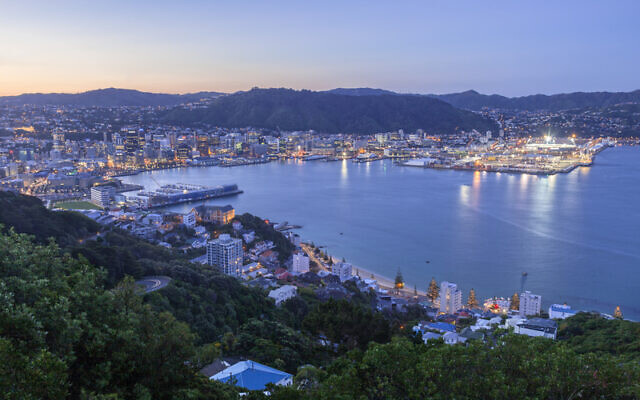Wellington City Council’s flawed Ramallah gesture
'It is still unclear what the grounds are for a relationship between Wellington, the seat of government of one of the world’s oldest, most stable democracies, and Ramallah, the seat of an authoritarian regime that hasn’t held a general election since 2006.'
Late last month the City Council of Wellington, New Zealand’s capital, voted in favour of pursuing a “friendly city” relationship with Ramallah.
It might not seem it at first glance, but this was actually something of a victory for Israel supporters.
To understand why, we have to go back to a May 15 tweet that began: “Greetings of Nakba Day to all”, by Wellington City Councillor Nikau Wi Neera. He gleefully announced he had delivered a notice of motion to debate Wellington recognising the State of Palestine, becoming sister cities with Ramallah and lighting up a civic centre in Palestinian colours on next year’s “Nakba Day”.
The predominant theme of responses on Twitter suggested the council might like to focus on problems like infrastructure and transport, and not get involved in complex and divisive international disputes.
An official report from council staff advised against all three parts of the motion. It noted recognition of Palestine is not a function of local councils. It found a relationship with Ramallah does not align strongly with the current policy of the council. And it said Wellington is a “diverse and inclusive city” and it is inappropriate for venues themselves to be used to make statements, “particularly if the issue is divisive”.
A compromise was negotiated so that all that remained was to proceed with the development of “friendly city status” with Ramallah, with a view to establishing a sister city relationship once the council’s new international relations policy is finalised. It passed nine votes to seven after an impassioned debate.
While this was certainly a vast improvement, it is still unclear what the grounds are for a relationship between Wellington, the seat of government of one of the world’s oldest, most stable democracies, and Ramallah, the seat of an authoritarian regime that hasn’t held a general election since 2006.
The Economist Intelligence unit (Democracy Index) ranks Palestine as 117th out of 167 (New Zealand is second, and Israel 28th), and categorises it as an “authoritarian regime”.
The 2022 report of Freedom House says the Palestinian Authority (PA) “operates under an expired presidential mandate and has no functioning legislature. The PA governs in an authoritarian manner, engaging in repression against journalists and activists who present critical views on its rule”.
So, Ramallah is not a bastion of democracy, but let’s see if it shares social and cultural values with Wellington. The Arab Barometer research network’s 2019 study found that only five per cent of Palestinians from the West Bank accepted same-sex relations. It is no surprise, then, that gay people are routinely persecuted and hide their identity.
The 2022 Freedom House report notes that Palestinian women are underrepresented in most professions and encounter discrimination in employment and through societal norms.
Some Palestinian women are celebrated. Among other terrorists lionised through school and street naming in Ramallah, it has a square named after female Dalal al-Mughrabi, who was responsible for a 1978 bus hijacking in which 38 Israelis were killed.
It is curious that a city that prides itself on being diverse and inclusive would want to become “friendly” with a city that is not, to say the least, friendly to certain minorities.
In his speech at council, David Zwartz, an executive member of the New Zealand Jewish Council who has received a Queen’s Honour for services to the Jewish and interfaith communities, noted, “I would not be able to stand in Ramallah like I do today.”
However, Alternative Jewish Voices’ Marilyn Garson recalled working for four years in Gaza and occasionally in Ramallah “because it is the technology hub of Palestine. We did much of our work in the cafes, of which Ramallah has many. Does that sound familiar?”
Justice for Palestine’s spokesperson said Ramallah and Wellington are “remarkably similar”, being “vibrant cosmopolitan cities packed with cafes, eateries, galleries and museums. Both are hubs of technology and innovation”.
It will be news to most Kiwis that Wellington is a hub of technology and innovation, let alone Ramallah. Further, it is bemusing that after repeatedly hearing about how poor Palestinians are and what terrible conditions they live in, we discover that they live in a desirable destination (although not for Jews, gay people and women).
I therefore remain mystified as to the synergies between these two cities, apart from both having a lot of cafes, which will perhaps be one of the key planks in Wellington’s updated international relations policy next year. But I now realise I mistakenly thought there need to be synergies. After the vote Councillor Wi Neera said it was actually about “symbolism” and “a show of intra-indigenous solidarity”.
What a contrast that the day after these theatrics, a mission to Israel later this year was announced by the New Zealand Israel Innovation Hub, to be led by former leader of the opposition and now head of the Auckland Business Chamber, Simon Bridges.
While Wellington will still be in the throes of contemplating a relationship with Ramallah, Kiwis will be on the ground in the “start-up nation”, benefiting our country by learning, and fostering economic ties and connections. And, of course, dining in some sublime cafes.
Juliet Moses is spokesperson for the New Zealand Jewish Council.


comments